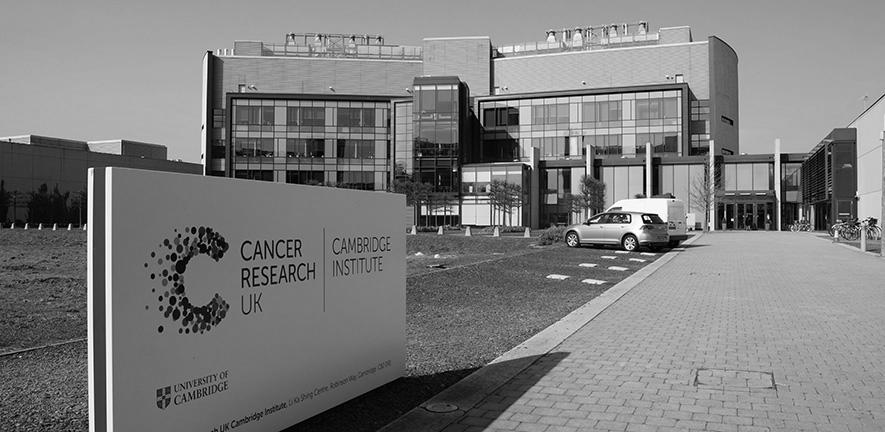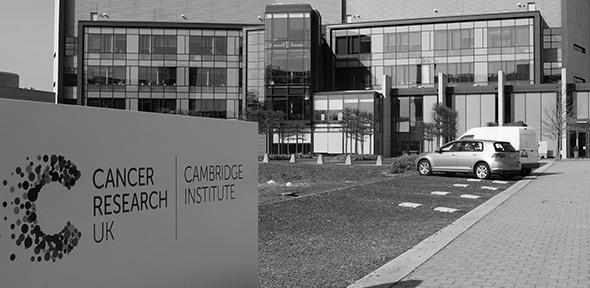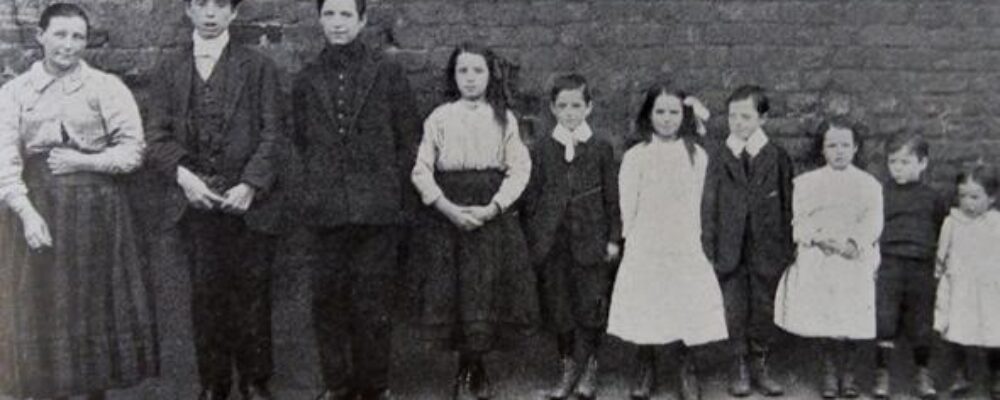
The significant funding commitment will enable world-class discovery science, unlocking new insights into how cancers develop, grow and spread, as well as examining how the immune system can be harnessed to combat the disease.
Research at the CRUK Cambridge Institute focuses on understanding every stage of the cancer life cycle – how tumours grow and spread and how this is impacted by the characteristics of each individual patient. By studying how tumours develop, adapt, and interact with their surroundings, scientists aim to uncover crucial insights into their behaviour.
Vice-Chancellor of the University of Cambridge, Professor Deborah Prentice, said: “From understanding and detecting cancer at its very earliest stages, to developing kinder treatments to building Cambridge Cancer Research Hospital, a transformative new cancer research hospital for the region, Cambridge is changing the story of cancer. For many years now, Cancer Research UK has played a vital role in enabling this world-leading work. Today’s announcement will ensure our researchers continue to find new ways to transform the lives of patients locally, nationally and internationally.”
Today’s £173 million announcement further boosts CRUK’s unwavering commitment towards its mission to beat cancer. The charity is investing in exciting new research programmes, forging new partnerships and is on track to invest more than £1.5bn on research over the five-year period 2021/22 to 2025/26.
Director of the CRUK Cambridge Institute, Professor Greg Hannon, said: “In a golden era for life sciences, this funding bolsters Cambridge as a major global hub for cancer research on an increasingly competitive worldwide stage and will greatly aid the recruitment of top-tier international talent.
“Research from the Institute has already made a positive impact for patients and their families, from the development of innovative technologies, diagnostic tests, and advanced imaging methods to the roll out of personalised medicine programmes for those with brain, breast, pancreatic, and ovarian cancers. We believe that only by embracing the complexity of cancer and how the disease interacts with the normal cells of patients can we move the needle on the hardest to treat cancers.”
The Institute is dedicated to improving cancer patients’ lives through discovery science and clinical translational research and has over 300 scientists working on groundbreaking discoveries taking research from laboratory bench to bedside.
Established in 2007, it was the first major new cancer research centre in the UK for over 50 years. In 2013, it became a department of the University of Cambridge School of Clinical Medicine, strengthening links with researchers across the University and at Addenbrooke’s Hospital, and further enhancing its position as a world leader with research transitioning into clinical trials, and ultimately new and better cancer treatments.
Professor Hannon added: “The Institute serves as a foundation for the entire Cambridge cancer research community through access to cutting-edge equipment and technical expertise. Only through understanding all aspects of the disease can we prevent, detect and treat cancer so that everybody can lead longer, better lives, free from fear of cancer.
“With this new funding, the Institute aims to accelerate its impact for patients, with new schemes to integrate clinicians into every aspect of our research and to embrace new technologies, including the promise of machine learning and artificial intelligence to enhance our discovery portfolio.”
The award, which will support the Institute over the next seven years, follows a comprehensive review of the facility led by an independent panel of international cancer experts who recognised research innovation.
CRUK Chief Executive, Michelle Mitchell, said: “We are delighted to confirm this incredible investment which is a reflection of the world-leading research community at the CRUK Cambridge Institute. The funding will underpin long-term cutting-edge discovery research, as well as supporting researchers to find new ways to improve cancer prevention and treatment, while creating innovative solutions to diagnose the disease earlier.
“This kind of funding would not be possible without the generosity of Cancer Research UK supporters and philanthropists.”
Work undertaken at the Institute includes:
- Understanding cancer: By gaining a deeper understanding of how tumours grow, adapt, and interact with their surroundings, scientists hope to uncover why some cells become cancerous and learn how each tumour’s lifecycle can affect a patient’s response to treatment and prognosis. Professor Greg Hannon’s team developed a diagnostic tool using virtual reality to explore every cell and aspect of breast tumours in unprecedented detail.
- Unravelling tumour interactions: Researchers are investigating a tumours’ ‘microenvironment’ – which includes the surrounding cells, blood vessels, and immune cells and how they interact. This is helping scientists to predict how well immunotherapy treatments will work.
- Cancer detection: Scientists are finding new ways to detect cancer earlier, predict the best course of treatments and tailor therapies to individual needs, to improve survival. Using tumour DNA, scientists can monitor the effectiveness of treatments and catch signs of cancer returning. Cambridge scientists are also working on a simple at-home test for future patients to regularly monitor their progress.
- Personalised medicine: Looking at the unique genetic mutations of a person’s tumour, including how it behaves and responds to treatment, allows treatments to be developed and matched to the specific genetic change. For example, Professor James Brenton’s team discovered a specific mutation in the most common form of ovarian cancer which is now used across the NHS as a cancer marker to measure treatment response for the disease.
Thanks to research, cancer death rates have fallen by 10% percent in the UK over the past decade. But in the East of England, around 37,400 people are still diagnosed, and around 15,700 lose their lives to the disease every year – underlining the vital need for new and better treatments.
Major studies seeking more accurate treatments for the deadliest cancers like ovarian and oesophageal cancer will also be supported at the Institute. Research undertaken by Professor Florian Markowetz and his team includes predicting cancer weaknesses to treatment, and spotting cancers as early as possible using AI technology.
There are 17 research groups based at the Institute – based on the largest biomedical campus in Europe – studying a range of cancer and technologies to support improved cancer treatments.
Find out how Cambridge is changing the story of cancer
Adapted from a press release from Cancer Research UK
“The University of Cambridge is a public collegiate research university in Cambridge, England. Founded in 1209, the University of Cambridge is the third-oldest university in continuous operation.”
Please visit the firm link to site






